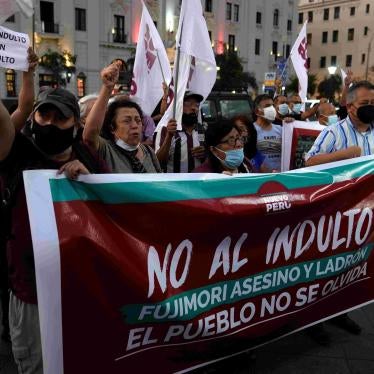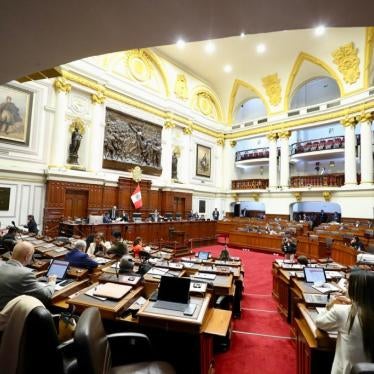(Washington, DC) – The decision by Peru’s Congress on March 7, 2024, to arbitrarily remove two members of the National Board of Justice severely undermines judicial independence, the rule of law, and the protection of human rights, Human Rights Watch said today. The Organization of American States (OAS) should convene a meeting of its Permanent Council to address ongoing attacks on judicial independence in Peru.
The board appoints and removes judges and prosecutors, as well as the heads of the agencies that organize elections and maintain the electoral registry. The removal of its members opens the door to political influence in the justice and electoral systems, endangering the right to vote.
“Peru’s Congress has severely weakened one of the last standing independent bodies that could serve as a check on its abusive practices,” said Juanita Goebertus, Americas director at Human Rights Watch. “Members of Congress seem to be trying to block investigations that could expose their own misconduct and influence the appointment of prosecutors and judges.”
Congress had been trying to dismiss National Board of Justice members, whose five-year tenures expire in January 2025, through several means for months.
These efforts seem to have accelerated after a team of anti-corruption prosecutors alleged in November 2023 that then-Attorney General Patricia Benavides had influenced congressional decisions in exchange for closing criminal investigations against lawmakers. As of September 2023, prosecutors were reportedly investigating at least 47 of the 130 members of Congress for various offenses, in many cases connected to corruption. The board suspended Benavides in December 2023 and opened an investigation into the allegations.
On March 7, Congress removed two of the board's seven members, citing a disagreement between lawmakers and the board over the interpretation of the law regarding the required age to be a member of the board. Lawmakers tried to remove all other board members but have so far failed to muster sufficient votes.
Peru’s constitution requires that anyone appointed to the board be under the age of 75. The board has interpreted that to mean that existing members appointed before turning 75 are not required to retire after they reach that age. The government agency in charge of public service administration supported the board’s interpretation. Under Peru’s constitution, Congress may only remove board members for “serious infractions.”
Under Peruvian law, members of the Permanent Commission of Congress, which previously discussed the removal of National Board of Justice members, are not allowed to participate in the final vote to dismiss them. But a member of the commission voted on the removal of board member Inés Tello, which was approved by a single vote majority. Congress’s press office issued a statement arguing that, because the member of the commission did not vote at the Permanent Commission’s session, he was allowed to vote in the March 7 session.
Separately, lawmakers complained that the president of Congress did not submit the removal of the board’s president to a second vote, after an initial attempt to dismiss him was rejected. This could be interpreted to allow Congress to vote again on his removal.
Peru’s Congress has led a severe erosion of judicial independence and the rule of law. In 2022, Congress used an improper process to appoint six Constitutional Tribunal judges. Since the appointments, the tribunal has made questionable decisions, including ordering the release from prison of former president Alberto Fujimori, in violation of orders issued by the Inter-American Court of Human Rights.
Congress also appointed an ombudsperson with no human rights experience, who will preside the commission in charge of selecting the new members of the National Board of Justice for the 2025-2030 term, and removed a top prosecutor without basis. Some lawmakers have introduced proposals in Congress, including most recently on March 5, to remove the head of the National Elections Tribunal.
In February, a group of lawmakers introduced a bill that would declare an “emergency” in the Attorney General’s Office and remove the interim attorney general, who stepped in after Benavides’s suspension, and the five other members of the Board of Superior Prosecutors, who select the attorney general from among its members.
On March 6, Congress also approved several changes to the constitution allowing for the reelection of members of Congress—which has been prohibited since a 2018 referendum—and reinstatement of the Senate. It also limited the powers of the president to dissolve Congress, while maintaining Congress's ability to oust the president on broad grounds.
The international community should condemn the flawed removal of the National Board of Justice members and speak out in defense of Peru’s democratic system, Human Rights Watch said.
OAS Secretary General Luis Almagro or the organization’s member states should convene a meeting of the body’s Permanent Council to discuss the situation in Peru. Under the OAS Inter-American Democratic Charter, Peru’s government has an obligation to promote and defend the separation of powers and independence of the branches of government as essential elements of a representative democracy.
The Inter-American Democratic Charter allows any member state—or the secretary general—to convene the Permanent Council when a member nation suffers an “unconstitutional alteration of the constitutional regime that seriously impairs the democratic order.”
“Instead of serving people, many lawmakers in Peru seem intent on misusing their office to pursue personal interests, destroying human rights and democratic accountability on their way,” Goebertus said.









